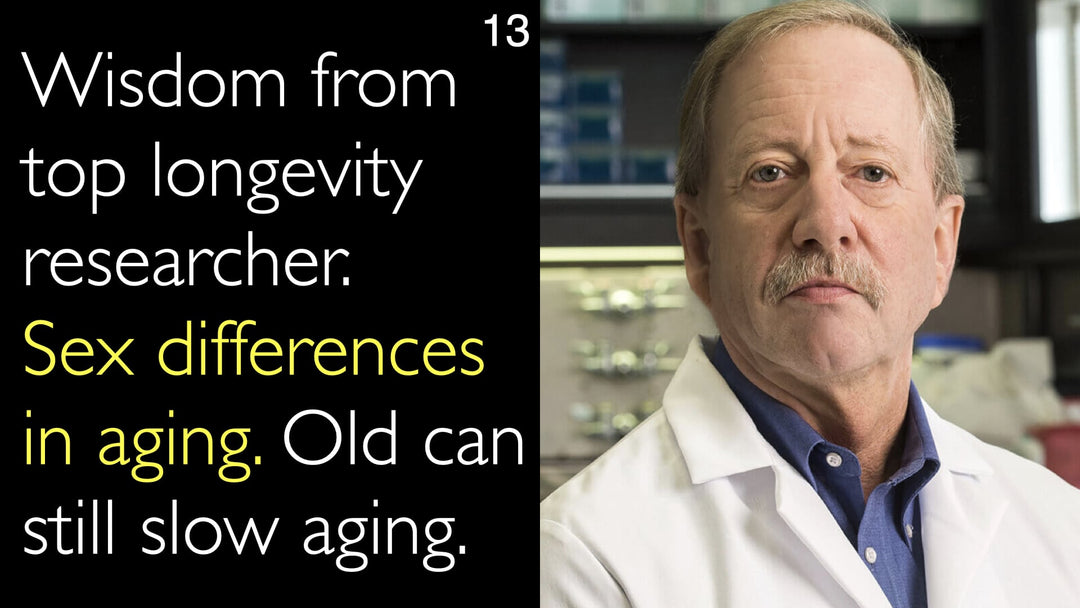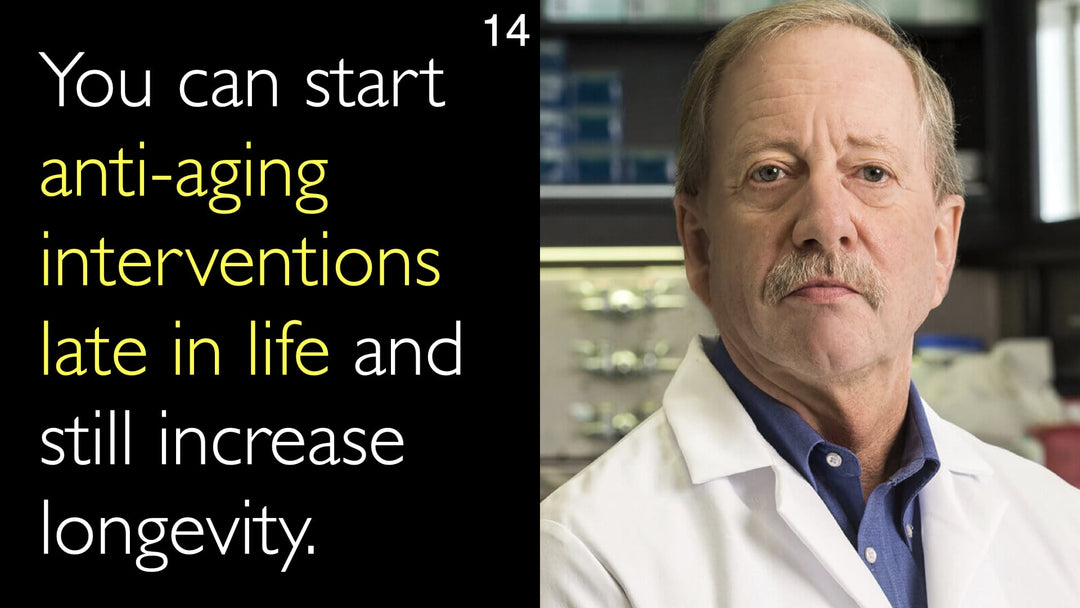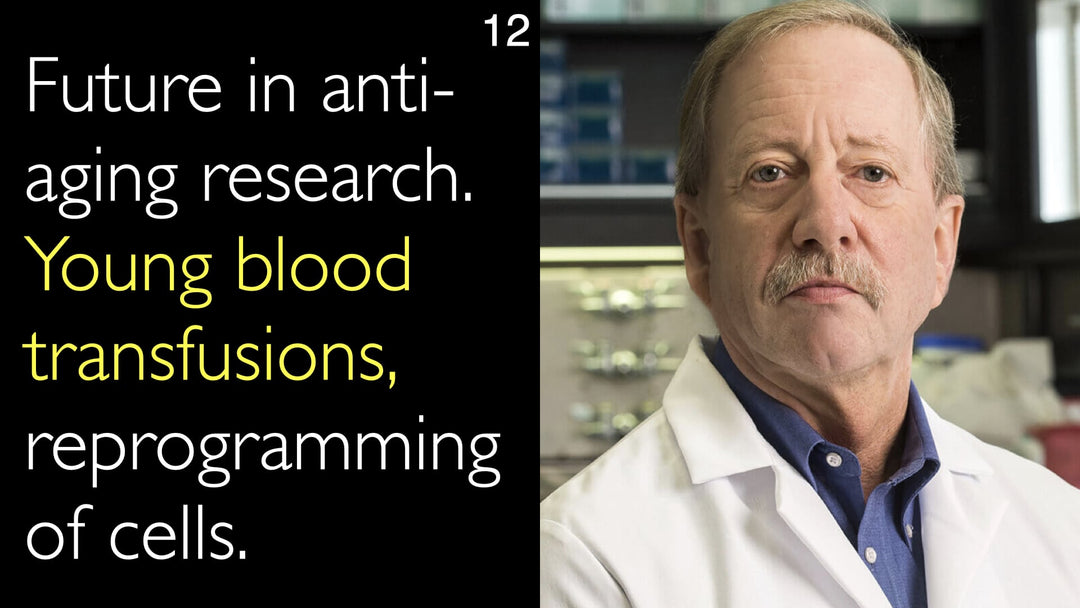Dr. Steven Austad, MD, PhD, ein führender Experte in der Alters- und Langlebigkeitsforschung, teilt die überraschendsten Erkenntnisse aus Jahrzehnten der Anti-Aging-Forschung. Er beleuchtet bedeutende Geschlechtsunterschiede im Alterungsprozess und zeigt, dass Behandlungen selbst bei spätem Beginn noch wirksam sein können. Dr. Austad erörtert das Potenzial für geschlechtsspezifische Medikamente und die ermutigende Einsicht, dass es nie zu spät ist, die Gesundheitspanne (Healthspan) zu verbessern.
Geschlechtsunterschiede im Alterungsprozess und späte Interventionen für Langlebigkeit
Direktnavigation
- Geschlechtsunterschiede in Alterungsprozessen
- Personalisierte Medizin für das Altern
- Wirksamkeit später Interventionen
- Einfluss von Bewegung und Ernährung auf das Altern
- Zukünftige Richtungen der Alternsforschung
- Vollständiges Transkript
Geschlechtsunterschiede in Alterungsprozessen
Dr. Steven Austad, MD, PhD, bezeichnet Geschlechtsunterschiede im Altern als eine der überraschendsten Erkenntnisse der Langlebigkeitsforschung. Er erläutert, dass Männer und Frauen auf biologischer Ebene unterschiedlich altern – eine grundlegende Entdeckung, die zu Beginn seiner Karriere nicht absehbar war. Die Implikationen für das Verständnis von Gesundheitsspanne und Lebensdauer sind tiefgreifend.
Personalisierte Medizin für das Altern
Diese Geschlechtsunterschiede eröffnen die erste Welle echter personalisierter Medizin im Bereich des Alterns. Dr. Austad geht davon aus, dass künftige Anti-Aging-Medikamente bei Männern und Frauen unterschiedlich wirken werden. Das bedeutet, dass Behandlungen geschlechtsspezifisch angepasst werden könnten, um wirksamer zu sein, und damit über einen Einheitsansatz hinausgehen.
Wirksamkeit später Interventionen
Eine weitere große Überraschung für Dr. Steven Austad, MD, PhD, war die Erkenntnis, wie wirksam Interventionen selbst in späteren Lebensphasen noch sein können. Früher nahm er an, dass Behandlungen bereits in den 20ern oder 30ern beginnen müssten, um signifikante Auswirkungen auf die spätere Gesundheit zu haben. Die Forschung zeigt nun, dass selbst ein viel späterer Beginn im Alterungsprozess erhebliche Vorteile bringen kann.
Einfluss von Bewegung und Ernährung auf das Altern
Dr. Steven Austad, MD, betont, dass verschiedene Interventionen auch im fortgeschrittenen Alter wirken können – darunter medizinische Behandlungen, Bewegungsprogramme und Ernährungsumstellungen. Die Einsicht, dass es „nie zu spät“ ist, die Gesundheitsspanne positiv zu beeinflussen, ist für ihn besonders ermutigend und bietet älteren Menschen Hoffnung, ihre Lebensqualität zu verbessern.
Zukünftige Richtungen der Alternsforschung
Dr. Steven Austad, MD, PhD, blickt gespannt auf weitere Entdeckungen in der Anti-Aging-Forschung. Sein Gespräch mit Dr. Anton Titov, MD, unterstreicht die dynamische Entwicklung dieses Feldes. Künftige Forschung wird voraussichtlich mehr praktische Maßnahmen hervorbringen, die Menschen weltweit – unabhängig von Alter oder Geschlecht – ergreifen können, um ihre Gesundheitsspanne zu verlängern.
Vollständiges Transkript
Dr. Anton Titov, MD: Vielleicht können wir unser Gespräch mit einer letzten Frage abschließen: Was war in Ihren Jahrzehnten der Anti-Aging-Forschung die überraschendste Beobachtung, die Sie weiser gemacht hat?
Dr. Steven Austad, MD: Das ist eine gute Frage. Bin ich jetzt weiser? Ich denke, das Überraschendste aus der gesamten Alternsforschung sind die Geschlechtsunterschiede. Das hätte ich nie erwartet.
Zwei Dinge sind besonders bemerkenswert: Erstens könnten wir Medikamente haben, die spezifisch einem Geschlecht helfen und nicht dem anderen. Das wird sich wahrscheinlich als erster Bereich der personalisierten Medizin erweisen, da Wirkstoffe bei Frauen und Männern unterschiedlich wirken.
Zweitens ist überraschend, wie spät im Leben wir mit Behandlungen beginnen können – ob medizinisch, durch Bewegung oder Ernährung – und dennoch erhebliche Auswirkungen auf die verbleibende Lebenszeit haben.
Früher dachte ich, wenn man nicht in den 20ern oder 30ern damit anfängt, ist es zu spät, um die spätere Gesundheit noch maßgeblich zu beeinflussen. Heute wissen wir: Das stimmt nicht. Es ist nie zu spät.
Das ist die zweite Überraschung, die ich nie vorhergesehen hätte. Und da ich jetzt älter bin als zu Beginn, ist das eine sehr erfreuliche Erkenntnis.
Dr. Anton Titov, MD: Professor Austad, vielen Dank für dieses äußerst aufschlussreiche Gespräch. Es war höchst faszinierend. Wir hoffen, in Zukunft weitere Einblicke in die Anti-Aging-Forschung von Ihnen zu erhalten – und vielleicht auch praktische Maßnahmen, die Menschen weltweit ergreifen können. Vielen Dank.
Dr. Steven Austad, MD: Oh, danke! Es war mir eine Freude. Auf Wiedersehen!






